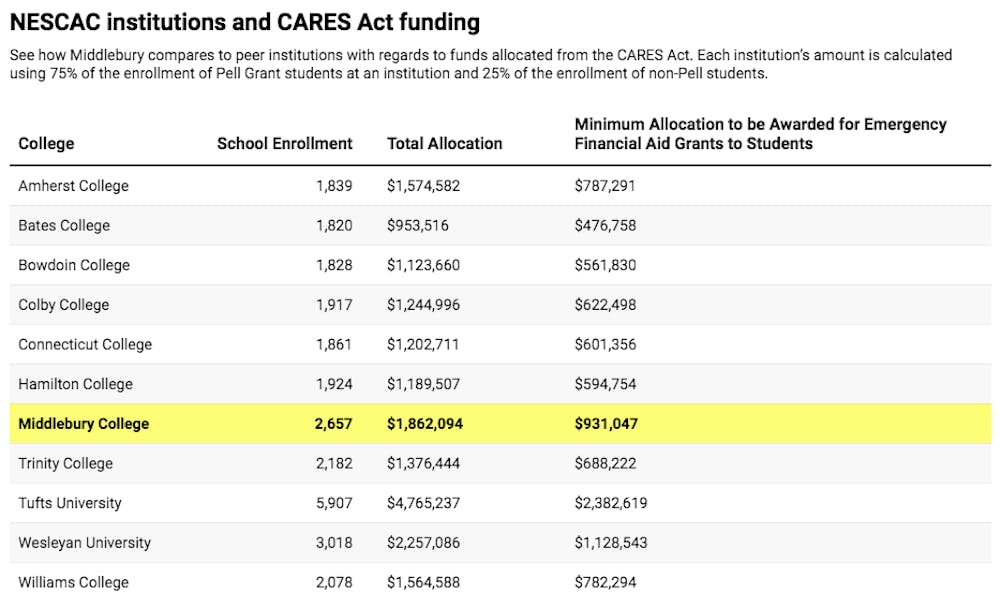The college will receive over $1.8 million from the Department of Education as part of the Coronavirus Aid, Relief, and Economic Security (CARES) Act to help offset costs related to supporting students during the Covid-19 pandemic.
Under section 18004(a)(1) of the act passed in Congress in March, Middlebury has been allocated $1,862,094, half of which ($931,047) must go to emergency financial aid grants to students. According to the law’s stipulations, the remaining half can be allocated to students according to each institution’s financial plan.
Middlebury has chosen to accept its portion of the $12.56 billion Higher Education Emergency Relief Fund. This comes as other elite schools such as Harvard, Yale and Princeton chose to reject these emergency funds, asking the Department of Education to re-allocate their funds to support other institutions in need.
According to the provisions of the act, each institution’s amount is calculated using 75% of the enrollment of Pell Grant students at an institution and 25% of the enrollment of non-Pell students. Compared to Middlebury’s peer schools in the NESCAC, Middlebury’s allocation amount is closest to Amherst College ($1,574,582) and Williams College ($1,564,588). Tufts University was awarded $4,765,237 given its enrollment of 5,907 students, the highest in the NESCAC.
In a letter to college and university presidents on April 9, Secretary of Education Betsy DeVos said that “the only statutory requirement is that the funds be used to cover expenses related to the disruption of campus operations due to coronavirus,” encouraging each institution to prioritize students with the greatest need. Eligible expenses include food, housing, course materials, technology, health care and child care.
Newly released guidance on April 21 clarified who could receive these funds, despite the law itself making no mention of eligibility for federal student aid (Title IV) to qualify for CARES funding. As reported in the Chronicle of Higher Education, international students and undocumented immigrants — including those under Deferred Action for Childhood Arrivals (DACA) protection — are excluded from receiving the allocated emergency student aid.
David Provost, executive vice president for finance and administration, said that the funds for student emergency financial aid grants will be distributed in the next few weeks in the form of direct checks. “It’s very prescriptive as to what you can use it for,” he said. The school will prioritize its highest need students in the coming weeks.
Provost anticipates that the college will use the remaining funds under the second part of the allocation to offset already paid expenses, helping reduce the significant deficit the college is projecting for fiscal year 2020. These expenses include a combination of the refunds that were given to students, travel vouchers and payments given to students for computer and internet access. Provost will report this breakdown following the distribution of the funds.
These funds are also supplemented by the Middlebury Student Emergency Fund, an online giving campaign that has raised over $89,000 so far. “If we have those dollars to give to students we won’t be using the Middlebury Student Emergency Fund for any new needs in the short term, but we think there will be additional needs in the fall,” Provost said.
College to receive 1.8 million in CARES Act stimulus

Comments



